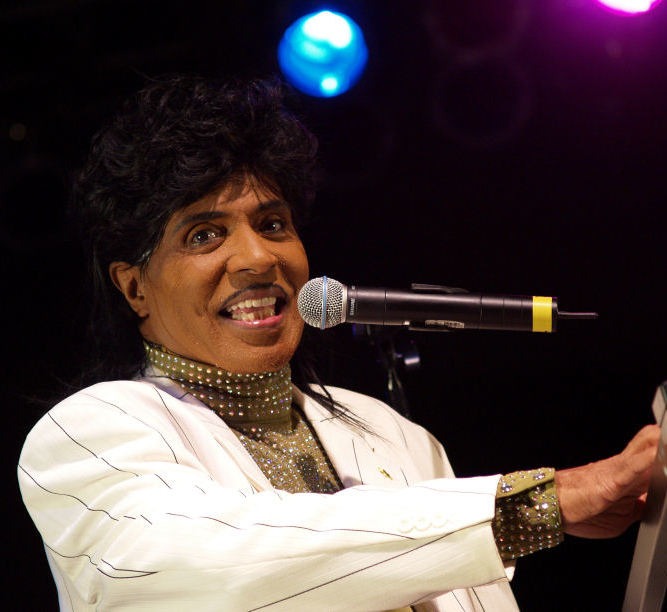Richard Wayne Penniman AkA “Little Richard”.
Richard Wayne Penniman, known by the stage name of “Little Richard”, proclaims himself as “The Architect of Rock and Roll”. He has been known by other aliases, including: “The Real King of Rock and Roll“, “The King of Rockin’ n Rollin'”, “The Rhythm and Blues Soulin'”, among others.
There is some justification to his rather boastful claims. According to music experts, he introduced funk into rock and roll music, and his loud, raspy vocals turned the genre into a more exciting, electrifying and dynamic form.
Penniman’s braggadocio and flashy persona onstage were formed early, coming from a very religious African Methodist Episcopal family, where singing was an essential part of the activity. His family performed in local churches and also entered in singing competitions. He was a faith healer when he was 10, and once thought of becoming a preacher.
His well-known sexual orientation was a bit of an issue within the family, who rooted him in devout Episcopalian Christian faith. Penniman’s father banished him from their home when he learned of his son’s effeminate mannerisms. When Penniman started recording, his father began to reconcile with him.
His earliest musical influences were mainly gospel singers like Marion Williams, Mahalia Jackson, and Sister Rosetta Tharpe. Tharpe once invited Penniman to sing a song with her onstage in 1945, and it was there that Penniman decided that his future career should be in music.
Penniman began his career when he was in his teens, engaging in performing and living on the road that he soon began to lose his interest in his studies.
Penniman’s first foray into professional recording started when he was signed up to RCA Camden in 1951, waxing off “jump blues” (an uptempo type of blues) records. During his stay at Camden, a tragedy struck in the family when his father was shot to death by Penniman’s friend.
In 1953 he began recording for Peacock Records. But after releasing one record to the next under the label, none of them made any success in the charts. Unhappy with the state of his career, he began to form a new R&B band, and continued performing.
He recorded a demo for R&B/gospel label Specialty Records, which loaned him some money to buy out his contract from Peacock. There the road to success and fame opened for him. Penniman’s first single under Specialty, “Tutti Frutti”, was a song he actually written in freestyle, only re-written to become commercially viable.
Tutti Frutti reached #2 in Billboard’s R&B charts in 1955. 17 subsequent hit singles followed, notably “Long Tall Sally”, “Rip It Up”, “Good Golly, Miss Molly”, and “Lucille”, among others. His characterstic driving piano performance, funky style, and wild screams in his songs made Penniman, now Little Richard, famous.
With widespread fame and commercial success came with his experiences with low life, like with many rock n’ roll stars. He indulged himself in excessive drinking, and setting up orgies (particularly in the mid-1950s).
Little Richard decided to committ himself into evangelism in October 1957, and settled into married life. Since then he had been shunning himself from recording secular music, and instead established himself as a gospel singer, with some success. Three of his gospel songs he recorded in the early 60s, “He Got What He Wanted”, “He’s Not Just A Soldier”, and “Crying In The Chapel” (under Atlantic Records) were hit pop charts.
But difficulties in maintaining his Christian life and also his rocking marriage led him again to his earlier abject lifestyle. Little Richard also returned to recording secular rock-n-roll songs, but none of them matched the success of his earlier singles.
After a harrowing near-death encounter over drugs-related debt with his longtime friend, Little Richard decided to renew his Christian faith. He now manages to reconcile his spirituality with rock-n-roll, once stating that it is not impossible to be a devout Christian and play rock-n-roll music at the same time. Now considering himself as straight, he has stayed single for many years and been serving as a minister while remaining very much active in the music industry.
Despite his roller-coaster, often sleazy past before settling into a quiet life, Little Richard’s contribution and importance to the music industry is still unquestionable. He has influenced many artists including Paul McCartney, Jimi Hendrix, Mick Jagger, and a number of rock bands. Even The King, Elvis Presley, also acknowledged Little Richard, once telling the latter: “your music has inspired me — you are the greatest”.
He merged funk, R&B, gospel and soul and transformed them into his own unique and outstanding style, and has been hailed by many as a musical genius. His legacy also stems from breaking the racial barriers of his audience. White people as well as black had been drawn to the power of his music and his outrageous yet charismatic presence onstage, particularly during his heyday. Segregation and racist groups notwithstanding, Little Richard’s records and sold-out concerts continued to be patronized and attended by both races.
Little Richard is one of the first inductees to the Rock And Roll Hall Of Fame in 1986. Four years later, he was honored with a star on the Hollywood walk of Fame and in 1993, received a Lifetime Achievement Award at the Grammys. Those are just a few of the many testaments of his enduring fame and influence, not to mention a generation of music fans to come.

